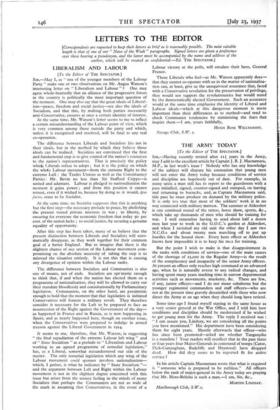THE ARMY TODAY
[To the Editor of THE SPECTATOR.] Sta,—Having recently retired after Ili years in the Army, may I add to the excellent article by Captain J. R. J. Macnamara, M.P., in last week's issue ? Nobody who has any knowledge of the subject will dispute his contention that young men will not enter the Army today because conditions of service and discipline are hopelessly out of date. For example, in many units a man still has to report to the guardroom with a pass initialled, signed, counter-signed and stamped, on leaving and returning to barracks, and, as Captain Macnamara said, this pass he must produce on demand by the military police. It is only too true that most of the soldiers' work is in no way connected with military matters. The summer at Aldershot is one continual round of the tattoo, horse show, sports, &c., which take up thousands of men who should be training for war. I well remember having to send about half a dozen men last year to work in the G.O.C.'s garden at Aldershot, and when I revisited my old unit the other day I saw two N.C.O.s and about twenty men marching off to put up hurdles for the hound show. Every keen officer at Aldershot knows how impossible it is to keep his men for training.
But the point I wish to make is that disappointment in the ranks with conditions of service—one of the main causes of the shortage of 25,000 in the Regular Army—is the result of the complacency and incapacity of the senior Army officers. At present an officer only reaches high command at an advanced age, when he is naturally averse to any radical changes, and having spent many years marking time in narrow departmental activities such as movements, musketry, &c. There are few, if any, junior officers—and I do not mean subalterns but the younger regimental commanders and staff officers—who are not at the present time gravely dissatisfied with those who now direct the Army at an age when they should long have retired.
Some time ago I found myself staying in the same house as a very senior general at the War Office, and I told him how conditions and discipline should be modernised if he wished to get young men for the Army. The reply I received was : " I can assure you, Lindsay, we are considering all the points you have mentioned." His department have been considering them for eight years. Shortly afterwards that officer—who has since been promoted—asked me whether Tanganyika is a mandate ! Your readers will recollect that in the past three or four years four Major-Generals in command of troops (Cator, Dick-Cunyngham, Radcliffe and Heywood) have dropped dead. How did they come to be reported fit for active service ?
In his article Captain Macnamara wrote, that what is required is " someone who is prepared to be ruthless." All officers below the rank of major-general in the Army today are praying that Mr. Hore-Belisha is such a man —I am, Sir, &c„ Marlborough Club, S.W.r. MARTIN LINDSAY.






























































 Previous page
Previous page